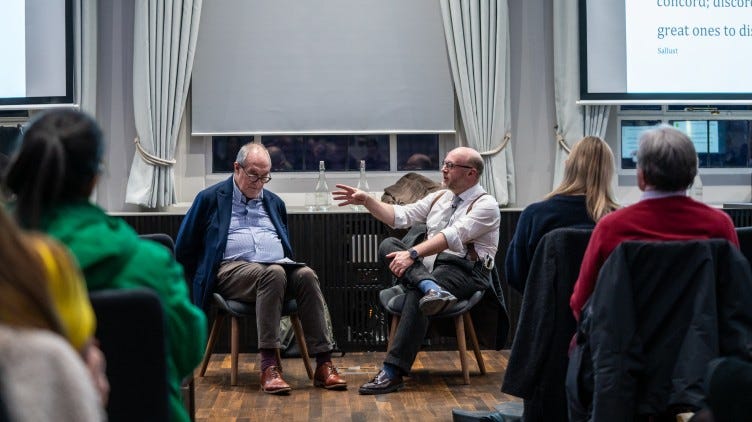As we countdown to launch of my new book, the Inequality of Wealth in January (do join us for the launch!) we’re not short of stories about the breath-taking scale of inequality in Britain.
But, in one of my pre-launch talks one great question came up: when all is said and done, why should we care? The answer is simple. Aside from the basic question of injustice - which some will always contest - unequal societies are societies that soon become poor, corrupt and stagnant. And that’s exactly where we’re heading if we don’t change course now.

Some of the wealth inequality news we’ve seen in recent days is extraordinary.
In a landmark report, the Resolution Foundation revealed the intimate links between the Britain’s low levels of growth and our high levels of inequality. Meanwhile, UBS reported that while most of the Western world is mired in a cost of living crisis, over the last year alone, the world’s lucky 2,544 billionaires have watched their wealth grow by a trillion dollars to $12 trillion.
Lots of this money is obviously going into property and in London, it turns out that in the last twelve months almost 200 homes have been sold for over £10 million - many of which will no doubt be getting their special Christmas make-overs. Which as the Telegraph tells us (their photo features above) can now cost up-to £175,000 for in-door igloos, giant LED reindeers, a giant carousel on the lawn, giant nutcracker or personalised life-size BearBrick teddy bears.
“Imagine the things you might see in a department store or a shopping centre” one designer told the paper, “but grander and more personalised.” Lucky them.
So, why should we care?
Well, to start with unequal societies tend to become poorer societies.
Economists now tell us that inequality is bad for almost everyone, because inequality is very bad for economic growth. Both the International Monetary Fund (IMF) and the Organisation for Economic Development and Co-operation (OECD) have shown that inequality slows economic growth and makes growth less sustainable over time.() More recent research from the United States reveals that as the top 1 per cent pile up their riches, they tend to hoard it rather than spend it, again slowing the rate of growth and reducing investment.
Worse, there is a nasty habit amongst some of the super-rich to minimise their taxes, thereby impoverishing the nation’s exchequer. A fascinating set of social science experiments in America now appear to point to the links between wealth and anti-social behaviour, like refusing to share. And of course, in recent years we have had the veritable snowstorm of 36 million leaked files, showered on journalists like a ticker tape parade on Broadway, which has unshadowed a common thread in three scandals with sunny code-names. The great data dumps of the Panama, Paradise and Pandora files revealed the sheer scale of wealth disguised out of sight of the tax authorities by the most powerful of perpetrators, including 120 politicians and their immediate relatives.
Second, unequal societies risk becoming corrupt societies where big money sloshes into politics generally to promote ideas that benefit those who already have plenty.
There are, of course, notably philanthropic billionaires. The problem is that many of those with great wealth venture into politics for the worst of reasons, equipped with very low levels of empathy and a concern to dismantle anything resembling redistribution.
One US study on the political views and activities of the top 1 per cent of American wealth-holders concluded:
‘We find that they are extremely active politically and that they are much more conservative than the American public as a whole with respect to important policies concerning taxation, economic regulation, and especially social welfare programs.’
If you’re in any doubt about whether that applies to Britain, just remember that in the UK, one in ten Conservative members of the House of Lords have donated more than £100,000 each to their party, a total of almost £50 million.
But, third, unequal societies are inevitably stagnant societies because social mobility begins to collapse. Although he is too modest to admit it, Professor Miles Corack could lay a good claim to have discovered the Gatsby Curve, later popularised by Alan B. Krueger, Chair of President Obama’s Council of Economic Advisers.
The curve plots the inequality of nations and how easy it is for the poor to rise up and become rich; more specifically, it shows, in essence, how the inequality in a country is very closely related to the likelihood of one generation rising to earn more than its parents’ generation.
The key value of the curve for Miles lies in the questions it provokes about the fortunes of those at the top, in the middle and at the bottom of the labour market. As he put it to me, in an interview for the book:
‘When you actually look at the Great Gatsby curve, what we're really interested in is… our long-term measures of people's earnings power, which are correlated more closely to wealth.’
And what appears to happen – as we might have guessed – is that wealth generates not simply wealth but privileges whereby children of wealth can earn more wealth.

This is one big reason why unequal societies are bad for growth - because natural talent is prevented from fulfilling its full potential by entrenched interests.
A good illustration is the contrast between Korea - where I’ve just returned from a visit with the Business & Trade Committee – and the Philippines.
Back in the 1950s, the countries’ respective levels of economic development was similar,but Korea was the far more equal nation of the two. Over the years that followed, Korean growth surged ahead in part because its economy wasn’t bedevilled by the sort of corruption that characterised the extremely unequal Philippines. It’s one reason why the new levels of inequality in Korea are hotly debated and feature centre-stage in films like Parasite.
Inequality in Britain is bad today. That puts us at risk of becoming poor, corrupt and unequal. But we’re on the cusp of inequality getting far, far worse. Indeed, Gen Z, that extraordinary generation born since the millennium will become the most unequal generation in half a century.
As the baby-boomers die, they’ll bequeath an extraordinary £5.5 trillion to their heirs. In fact, globally we can already see the impact.
UBS which monitors this sort of thing, recently reported: ‘the majority of billionaires that accumulated wealth in the last year, did so through inheritance as opposed to entrepreneurship. This is a theme we expect to see more of over the next 20 years, as more than 1,000 billionaires pass an estimated $5.2 trillion to their children’.
We are at a tipping point. If we don’t take action now to rebuild a wealth-owning democracy, we risk any real measure of equality this century becoming beyond reach. And that will have some very nasty consequences.





